Join Our Telegram channel to stay up to date on breaking news coverage
In an unprecedented response to months of scandal, political upheaval, and public outcry over alleged lottery manipulation, the Texas Legislature has voted to abolish the Texas Lottery Commission and transfer oversight of the state’s $8 billion lottery system to the Texas Department of Licensing and Regulation (TDLR). This dramatic restructuring follows explosive allegations of rigged jackpots, questionable third-party courier operations, and a cascading series of resignations and investigations that have fundamentally undermined public trust in one of America’s largest state lottery systems.
The legislative action represents one of the most significant shakeups in U.S. state lottery history, driven by what lawmakers describe as systematic failures in oversight, transparency, and regulatory control. The move comes after high-profile jackpot wins under suspicious circumstances that critics argue exploited regulatory loopholes and compromised the integrity of the lottery system that generates billions in revenue for Texas public education and veterans’ programs.
Key Takeaways
- Commission Abolished: The Texas Legislature has voted to dissolve the Texas Lottery Commission, transferring all operations to the Texas Department of Licensing and Regulation for a two-year trial period.
- Scandal Catalyst: The decision follows suspicious jackpot wins including a 2023 incident where a European syndicate bought nearly all possible ticket combinations and a 2025 courier-facilitated $83.5 million win.
- Courier Ban: Senate Bill 3070 prohibits all third-party courier services and online ticket sales, while capping ticket purchases at 100 per transaction.
- Political Fallout: Multiple senior officials resigned amid investigations by the Texas Rangers and Attorney General Ken Paxton’s office.
- Ongoing Investigations: Federal and state authorities continue probing potential fraud, regulatory failures, and possible internal misconduct.
- Public Trust Crisis: Lieutenant Governor Dan Patrick characterized the incidents as “one of the biggest heists ever,” demanding comprehensive reform.
- Two-Year Review: The new structure includes a sunset provision allowing lawmakers to potentially eliminate the lottery entirely if accountability measures fail.
The Scandal: Systematic Exploitation and Regulatory Failures
The crisis that ultimately led to the commission’s abolition centers around a series of highly controversial jackpot wins that exposed fundamental vulnerabilities in Texas lottery operations and oversight.
The 2023 “Bulk Purchase” Incident
The most explosive scandal occurred in April 2023 when a European gambling syndicate, operating through Texas-based courier services, executed what critics describe as a systematic exploitation of the lottery system. The syndicate purchased nearly all possible ticket combinations—over 25.8 million tickets—for a $95 million jackpot, virtually guaranteeing a win through mathematical manipulation rather than chance.
This unprecedented “bulk buy” operation was executed across four retail locations, requiring the printing of millions of individual tickets over an extended period. The scale of the operation raised immediate questions about:
- Regulatory Oversight: How such a massive coordinated purchase could occur without triggering oversight mechanisms
- Fairness Concerns: Whether allowing bulk purchases effectively transforms a game of chance into a mathematical certainty for well-financed groups
- Retailer Compliance: The role of participating retail locations in facilitating the scheme
- Commission Response: The adequacy of existing rules and monitoring systems
Industry experts noted that while the purchase was technically legal under existing regulations, it fundamentally undermined the lottery’s premise as a game of chance accessible to ordinary citizens. The incident drew comparisons to sophisticated gambling operations that exploit regulatory gaps rather than relying on luck.
The 2025 Courier-Facilitated Win
The controversy intensified in early 2025 when a Texas woman won an $83.5 million jackpot after purchasing her ticket through an online courier application. This win, while smaller in scope than the 2023 incident, highlighted ongoing concerns about third-party services that allow players to purchase tickets without visiting retail locations.
The courier-facilitated win raised several regulatory concerns:
- Identity Verification: Questions about whether the actual winner could be verified when tickets are purchased through intermediaries
- Tax Implications: Complications in determining the legitimate winner for tax and legal purposes
- Regulatory Control: The commission’s ability to monitor and control ticket sales conducted through third-party platforms
- Fraud Prevention: Potential for manipulation when the chain of custody for winning tickets involves multiple parties
The immediate aftermath of this win prompted the Texas Lottery Commission to implement an emergency ban on third-party courier services, acknowledging that existing oversight mechanisms were inadequate to ensure integrity in these transactions.
Political Fallout and Leadership Crisis
The lottery scandals triggered a political firestorm that ultimately consumed the commission’s leadership and prompted calls for comprehensive reform from Texas’s highest-ranking officials.
High-Profile Resignations
Multiple senior officials within the Texas Lottery Commission resigned or were pressured to leave their positions amid the growing scandal. While specific details of individual departures remain sealed due to ongoing investigations, sources within the state government confirmed that the turnover included key positions in:
- Executive leadership responsible for oversight and policy implementation
- Regulatory compliance officers charged with monitoring suspicious activity
- Security personnel responsible for investigating potential fraud
- Communications staff who handled public relations during the crisis
The wave of resignations created a leadership vacuum at a critical moment when the commission faced intense scrutiny from lawmakers, law enforcement, and the public.
Statewide Political Response
Texas’s top political leaders unanimously condemned the commission’s handling of the scandals and demanded immediate accountability:
Lieutenant Governor Dan Patrick emerged as the most vocal critic, releasing a widely circulated video statement characterizing the 2023 incident as “one of the biggest heists ever” perpetrated against Texas taxpayers. Patrick vowed to “restore public trust” and threatened to abolish the lottery entirely if meaningful reforms were not implemented.
Governor Greg Abbott called for comprehensive investigation and reform, stating that the integrity of the lottery system was essential to maintaining public support for education funding generated through lottery proceeds.
Attorney General Ken Paxton launched formal investigations into both the courier operations and the commission’s internal controls, working in coordination with the Texas Rangers to determine whether criminal violations had occurred.
This unified political response from leaders across the Texas government reflected the severity of the crisis and the political vulnerability created by questions about lottery integrity.
Legislative Investigation and Reform Efforts
The Texas Legislature responded with multiple investigation committees and reform proposals, including efforts by some lawmakers to eliminate the lottery entirely. Representative Brent Money led a faction arguing that the lottery represented “an unfair game that is primarily paid by poor people in order to fund an area in our government.”
While complete abolition of the lottery failed to gain sufficient support, lawmakers across party lines agreed that the existing commission structure had proven inadequate to prevent exploitation and maintain public trust.
Senate Bill 3070: Comprehensive Reform and Restructuring
The legislative response to the lottery crisis culminated in Senate Bill 3070, authored by Senator Bob Hall, which completely restructures lottery oversight and implements comprehensive safeguards against future manipulation.
Commission Abolition and Transfer of Authority
The centerpiece of the legislation abolishes the Texas Lottery Commission entirely, transferring all operational authority to the Texas Department of Licensing and Regulation (TDLR) for an initial two-year trial period. This restructuring aims to:
- Eliminate Institutional Problems: Remove the existing bureaucratic structure that failed to prevent recent scandals
- Integrate Oversight: Place lottery operations under an established regulatory agency with broader enforcement capabilities
- Ensure Accountability: Subject the new structure to enhanced legislative review and oversight
The TDLR brings experience in regulating various licensed activities across Texas, including alcohol distribution, professional licensing, and other regulated industries that require integrity monitoring.
Comprehensive Operational Restrictions
Senate Bill 3070 implements several specific restrictions designed to prevent future exploitation:
Third-Party Service Prohibition: All courier services and online ticket sales are permanently banned, requiring players to purchase tickets directly from authorized retail locations. This eliminates the intermediary layer that facilitated recent controversial wins.
Bulk Purchase Limitations: Ticket sales are capped at 100 per individual transaction, preventing large-scale purchases that could effectively guarantee wins through mathematical manipulation rather than chance.
Enhanced Age Verification: Stricter identification requirements for ticket purchases, with enhanced penalties for retailers who fail to comply with age restrictions.
Retailer Oversight: More rigorous monitoring of retail partners, including mandatory reporting of unusual purchase patterns and enhanced penalties for compliance failures.
Sunset Review and Future Evaluation
Perhaps most significantly, the legislation includes a two-year sunset provision that requires comprehensive review of the lottery’s performance under TDLR oversight. This review will evaluate:
- Integrity Measures: Effectiveness of new safeguards in preventing manipulation
- Public Trust: Polling and analysis of public confidence in lottery operations
- Revenue Performance: Impact of new restrictions on lottery revenue and education funding
- Operational Efficiency: Comparison of costs and effectiveness between the old and new structures
Lawmakers retain the explicit option to eliminate the lottery entirely if the new structure fails to demonstrate adequate transparency, accountability, and public trust.
Investigations and Enforcement Actions
Multiple law enforcement agencies continue investigating various aspects of the lottery scandals, with potential criminal and civil consequences for individuals and organizations involved.
Texas Rangers Investigation
The Texas Rangers, the state’s premier law enforcement agency, are conducting a comprehensive investigation into:
- Potential Fraud: Whether any individuals or organizations violated state laws in their lottery-related activities
- Internal Misconduct: Possible misconduct by commission employees or officials
- Regulatory Violations: Failures in oversight and compliance that may constitute dereliction of duty
- Financial Crimes: Money laundering or other financial violations related to large jackpot wins
Attorney General Enforcement
Attorney General Ken Paxton’s office is pursuing parallel civil investigations focused on:
- Consumer Protection: Whether lottery players were defrauded through inadequate disclosure or misleading practices
- Regulatory Compliance: Civil penalties for commission failures to enforce existing regulations
- Recovery Actions: Potential recovery of funds through civil litigation
- Structural Reforms: Legal frameworks to prevent future violations
Federal Coordination
While lottery operations are primarily state-regulated, federal authorities are monitoring the situation due to potential:
- Interstate Commerce: Involvement of out-of-state entities in Texas lottery operations
- Tax Violations: Federal tax implications of large jackpot wins and potential evasion
- Wire Fraud: Use of electronic communications in potentially fraudulent schemes
- Money Laundering: Movement of large sums through financial institutions
Industry Implications and Nationwide Impact
The Texas lottery crisis has prompted examination of similar vulnerabilities in lottery systems nationwide, with several states reviewing their own regulations and oversight mechanisms.
Regulatory Best Practices
The Texas experience has highlighted several areas where state lottery systems may be vulnerable to exploitation:
Bulk Purchase Policies: Many states allow unlimited ticket purchases, creating potential for mathematical manipulation by well-financed groups.
Third-Party Services: The proliferation of courier and online services creates regulatory challenges that many states have not adequately addressed.
Oversight Mechanisms: Traditional lottery oversight may be inadequate for detecting sophisticated exploitation schemes.
Transparency Requirements: Public disclosure of unusual wins or purchase patterns varies significantly across states.
Industry Response
Major lottery industry organizations have begun developing recommended best practices based on the Texas experience:
- Purchase Limitations: Standardized limits on individual transaction sizes
- Enhanced Monitoring: Improved systems for detecting unusual purchase patterns
- Third-Party Regulations: Comprehensive frameworks for regulating courier and online services
- Integrity Auditing: Regular independent audits of lottery operations and oversight
State-by-State Reviews
Several states have initiated reviews of their lottery systems in response to the Texas crisis:
- California: Reviewing bulk purchase policies and third-party service regulations
- Florida: Examining oversight mechanisms and integrity safeguards
- New York: Assessing transparency requirements and public disclosure policies
- Illinois: Evaluating regulatory structure and enforcement capabilities
Economic and Social Implications
The Texas lottery restructuring carries significant implications for both state finances and social policy, given the lottery’s role in funding education and veterans’ programs.
Revenue Impact
The Texas lottery generates approximately $8 billion in annual revenue, with proceeds supporting:
- Public Education: Over $1.8 billion annually for Texas public schools
- Veterans’ Programs: Hundreds of millions for services supporting military veterans
- General Revenue: Additional funds for various state programs and services
The new restrictions on bulk purchases and third-party services may impact overall revenue generation, though proponents argue that increased public trust will ultimately support long-term sustainability.
Social Equity Concerns
Critics of the lottery system, including Representative Money and other lawmakers, have long argued that lotteries disproportionately impact lower-income citizens who purchase tickets hoping for financial improvement. The recent scandals have intensified these arguments by demonstrating how sophisticated players can exploit the system while ordinary citizens play at a disadvantage.
The new regulations attempt to address these concerns by:
- Preventing Exploitation: Eliminating bulk purchase advantages that benefit wealthy players
- Ensuring Fairness: Maintaining the lottery as a game of chance rather than mathematical manipulation
- Protecting Vulnerable Players: Enhanced responsible gambling measures and age verification
Future Outlook and Implementation Challenges
The successful implementation of Texas’s lottery restructuring faces several significant challenges that will determine whether the reforms achieve their intended objectives.
Operational Transition
Transferring lottery operations from the abolished commission to TDLR requires:
- Staff Integration: Retaining experienced lottery personnel while eliminating problematic oversight structures
- System Integration: Incorporating lottery operations into TDLR’s existing regulatory framework
- Vendor Management: Renegotiating contracts with technology providers, retailers, and other service partners
- Policy Development: Creating comprehensive new regulations under TDLR authority
Stakeholder Coordination
The transition must maintain coordination among various stakeholders:
- Retail Partners: Ensuring continued cooperation from thousands of lottery retailers statewide
- Technology Providers: Implementing system changes to support new purchasing limitations and monitoring requirements
- Law Enforcement: Coordinating ongoing investigations while maintaining operational continuity
- Education Community: Preserving funding flows to schools and educational programs during the transition
Performance Metrics
The two-year sunset review will evaluate success based on several key metrics:
- Integrity Measures: Absence of significant scandals or exploitation attempts
- Public Trust: Polling data and public confidence surveys
- Revenue Stability: Maintenance of adequate funding for education and veterans’ programs
- Operational Efficiency: Cost-effective administration under the new structure
Conclusion: A Watershed Moment for State Lottery Regulation
The abolition of the Texas Lottery Commission represents a watershed moment in American lottery regulation, demonstrating both the vulnerability of existing systems to sophisticated exploitation and the political consequences of regulatory failure. The comprehensive reforms implemented through Senate Bill 3070 attempt to address fundamental flaws in lottery oversight while preserving the system’s essential function in funding public education and veterans’ services.
The success or failure of Texas’s restructured lottery system will likely influence regulatory approaches nationwide, as other states grapple with similar vulnerabilities in their own lottery operations. The two-year sunset provision creates a unique experiment in lottery governance, with the ultimate fate of the system dependent on demonstrable improvements in integrity, transparency, and public trust.
For the broader gambling industry, the Texas crisis underscores the critical importance of robust regulatory oversight and the potential consequences of failure to maintain public confidence. As Lieutenant Governor Patrick noted in his calls for reform, the integrity of gambling systems depends not only on technical safeguards but on the credibility of the institutions charged with oversight.
The coming months will test whether the new structure can deliver the accountability and transparency that lawmakers and citizens demand, or whether the crisis of confidence proves irreparable, potentially leading to the elimination of one of America’s largest state lottery systems. The stakes extend far beyond Texas, as the success or failure of these reforms may shape the future of state-sponsored gambling across the United States and its eventual replacement with crypto-based casinos.
References
- CBS News Texas. (2025, May). “Changes to the Texas Lottery are coming under bill making its way through the Legislature.”
- Hoodline. (2025, May). “Texas House Votes to Dismantle Lottery Commission Amidst Scrutiny and Shift Oversight to Licensing Department.”
- CBS Austin. (2025). “Texas Lottery Commission bans third-party couriers amid recent controversy.”
- Texas Tribune. (2025, May 25). “House clears the way for Texas Lottery to continue under a different state agency.”
- Texas Border Business. (2025, May). “Texas Abolishes Lottery Commission Following $95 Million Jackpot Scandal.”
Join Our Telegram channel to stay up to date on breaking news coverage


